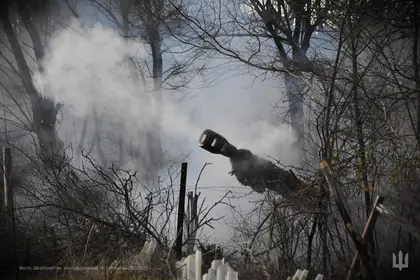Russian forces have admitted they are deploying prohibited chemical weapons against Ukrainian troops, even posting a video of them being used.
In a lengthy post on Telegram, the Black Sea Fleet's 810th Naval Infantry Brigade detailed what they described as “radical change in tactics” against Kyiv’s forces in Krynky, on the left bank of the Dnipro River near Kherson.
JOIN US ON TELEGRAM
Follow our coverage of the war on the @Kyivpost_official.
The post claims that elements of the brigade have adopted a new tactic of “dropping K-51 grenades from drones” onto Ukrainian positions to smoke them out of trenches and exposing them to small arms fire.
In another post, the brigade posted footage of a drone dropping one of the grenades onto a Ukrainian position.
As the Institute for the Study of War (ISW) notes: “K-51 aerosol grenades are filled with irritant CS gas (2-Chlorobenzalmalononitrile), a type of tear gas used for riot control (also known as a Riot Control Agent [RCA]).
“The Chemical Weapons Convention (CWC) prohibits the use of RCAs as a method of warfare, and Russia has been a state party to the CWC since 1997.
“ISW previously observed that Russian forces used K-51 grenades against Ukrainian positions in Donetsk Oblast in November 2022.”
Last month, Russia lost out in its bid for re-election to the decision-making body of the OPCW chemical watchdog, as Ukrainian President Volodymyr Zelensky cheered Moscow's “isolation” on the world stage.

Eurotopics: Ukraine War - What is Trump Up To?
Four Eastern European countries were competing for three seats on the OPCW Executive Council, warring neighbours Russia and Ukraine, plus Poland and Lithuania.
Russia received the fewest votes, meaning it has no seat on the board for the first time in the organisation's history.
The Organisation for the Prohibition of Chemical Weapons won the Nobel Peace Prize in 2013 for its efforts to rid the world of the scourge of chemical weapons.
It played a key role during the Syria civil war when Damascus agreed to dismantle its chemical weapons arsenal and ship it for destruction under the aegis of the OPCW.
This deal stopped Barack Obama from launching military action after a chemical attack in the Ghouta suburb of Damascus that crossed the “red line” set by the then US president.
In July, the OPCW was able to announce the milestone that all the world's declared stockpiles of chemical weapons were “verified as irreversibly destroyed.”
The United States had been the last of the signatories of the Chemical Weapons Convention, which came into effect in 1997, to destroy its stock.
You can also highlight the text and press Ctrl + Enter






